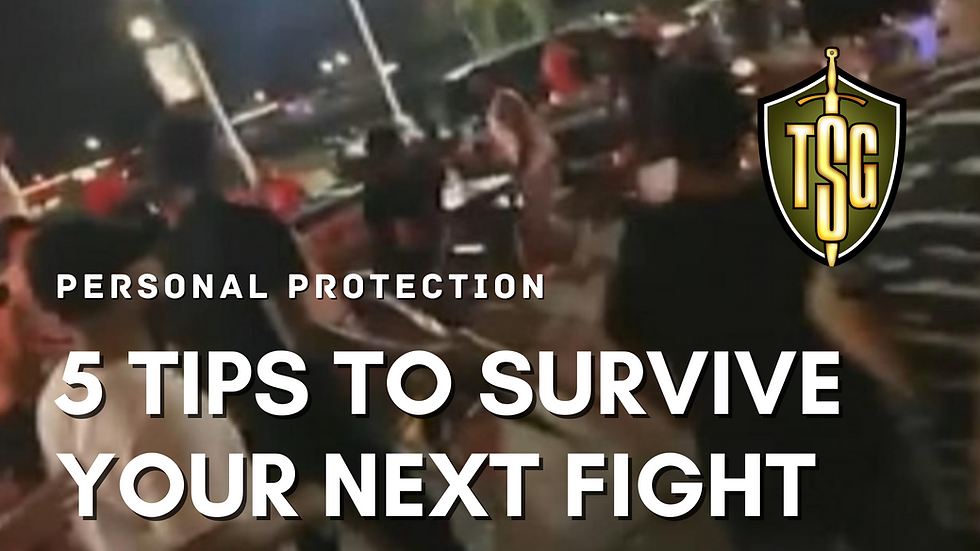The Importance of Innocence in Self- Defense Tactics
- Brad Parker

- Oct 19, 2023
- 4 min read
You've survived an assault. But what you do and say can hurt you in court.

When we defend ourself from an attacker we are putting ourselves in a delicate legal situation. We are basically using a level of force which normally would be considered unlawful, but legally is deemed justified because we were defending ourselves.
We need to be in a place where we are legally allowed, doing legally allowed activities, and acting in a way which does not harm or provoke others.
If we ultimately defend ourselves from an attack and injure or even kill the attacker, we have to be the ones that were wronged and we had no other choice but to use this level of force against the attacker.
There are a number of ways we can go from being an innocent victim to an aggressor which can be prosecuted by the state:
We can't start the fight then try to claim we were innocent because of the other person's actions. There are legal precedents that contain language like "a person is considered to be an aggressor when he has provoked present difficulty by language or by conduct towards another that is calculated and intended to bring it about".
We cannot pursue or attempt to re-engage the attacker. The court might see us as innocent in the first engagement, but we can be tried for the second engagement when we have caught up to the attacker.
We cannot engage in mutual combat and claim self-defense. If we decide to "take it outside and settle it" we are in mutual combat, and the law sees both of us as aggressors.
We cannot escalate the level of force out of proportion to the original attack and claim self-defense.
The element of innocence can also be lost through your pronouncements at the scene or to others – – including what you have said on social media.
If we have a long-standing Hatfield and McCoys type of disagreements with an individual or problematic neighbors, our self-defense situation might take on a whole different complexion. They claim it was you who started the fight when you came over to their house to complain about their dog, garbage, noise, parties, etc.
There is a case from a highly covered shooting at a contentious protest in Austin. In this case, a man in a car ended up shooting a protester who approached the driver side, aiming an AK style rifle at the driver. On the face of the incident, it appeared that the driver defended himself against the rifle wielding protester. The trial ended up finding the driver guilty. I assumed that the verdict was going to be appealed by the defense, but that never happened. Now it appears that evidence presented at the trial painted a very different picture of the circumstances leading up to the shooting. Apparently, social media posts by the driver indicated his willingness to engage with protesters, and seem to indicate that he would like to harm them. So, instead of the jury believing the driver made an accidental turn into the protest this evidence painted a picture that the driver deliberately put himself in that situation.
It appears that the driver's social media posts were enough to negate his claim of self-defense. At least, in this case, in this venue, in front of this particular jury.
How do we showcase our innocence in a self-defense situation?
There are two main ways to show your innocence in an altercation:
Physically withdraw from the fight;
Effectively communicate your withdrawal from the fight to the other person.
In theory this should be relatively easy:
Start backing away from the adversary with your hands up hands open, palms facing towards him;
Start verbalizing something like "I don't want to fight you, all I want to do is leave" or "leave me alone or I will call the police".
As soon as it is safe, call the police to report the assault on you.
Tactically, we are putting distance between us and our attacker while we are communicating to the attacker and to witnesses our willingness to withdraw. When we run away, we are often seen in the eyes of the law as "constructively communicating" our withdrawal. Better still, yelling for help as we run away emphasizes our genuine desire to withdraw from the fight.
In practice, however, it might be more complicated than it appears. If we continue with the fight might be seen as failing to try to withdraw. Remember, there are competing narratives at play here in the courtroom. There's our side and then there is the adversary's side or the state's side.
And the attorneys on the other side are going to gather as much evidence as they can to negate your claim of self-defense. That's why we have to make it clear and unequivocal that we did not want to start the fight in the first place and that we were trying to withdraw from the assault.
Tricky, I know.
We might want to consider purchasing additional insurance that is marketed to legal gun owners. At the very least, they provide a contact that you can make to provide initial legal advice if you were to become involved in any kind of altercation. Usually people buy this for protection against criminal and civil prosecution if deadly force ends up being used.
The physical part of self-defense is hard enough. Now we have to make sure that we consider the legal aspect of self-defense as well.



Comments